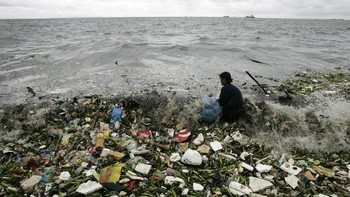Drones Being Used to Tackle Plastic Pollution
![]()
Guest post by Emily Folk
Plastic pollution, especially in our planet’s oceans, is one of the biggest problems we’re facing today. Conservationists have found plastic in the stomachs of 60% of seabird species, and 100% of sea turtles examined. These native animals mistake drifting plastics for a meal and fill their bellies. Afterwards, they starve because there’s no room for food in their digestive tracts.
Humans drop 8 million metric tons of plastic in the ocean every year, adding to the 150 million metric tons already floating around on currents and collecting in garbage patches twice the size of Texas. If it isn’t clear already, plastic pollution is a massive problem, but new technology might be the solution that we’ve been waiting for.
A Job for the Drones
Tons of plastic waste are floating around in the ocean as we speak. In fact, thousands of pounds have been discovered and cleaned up in oceans all across the globe. The plastic that isn’t cleaned out of our oceans are slowly breaking down and becoming a part of our food chain. When we enjoy a shrimp cocktail or a well-cooked filet, we’re eating tiny microplastics along with those healthy proteins and Omega 3s.
This mess, paired with ocean acidification — which is a side effect of human pollution and climate change — will make it more challenging than ever for wildlife in oceans to survive. Even if we started picking up every single piece of plastic we see in the sea, it’s become a job that’s too big for human hands. That’s where drones can pick up the slack.
By 2050, the ocean will have more plastic by weight than fish. Drones will have several different roles in the fight against pollution, from mapping the sheer amount of plastic currently floating in our oceans to guiding autonomous recovery vessels to the areas with the highest concentrations of contaminants.
Drone Major Group is one company drawing together more than 80% of the drone industry’s assets, connecting them in what could prove to be an unprecedented move toward industry-wide cooperation. However, one piece of the puzzle is missing.
AI and Machine Learning Tools
Even with drones, the job will be too big to handle without a little bit of help. Artificial intelligence (AI) and machine learning tools can pick up the slack, controlling the patrolling drones and analyzing seascapes to determine where conservationists should focus their efforts.
Artificial intelligence systems are superior to human analysts in that our biological limitations don’t restrict them. They can function with near-limitless storage and processing capabilities and can find patterns in minutes that would take humans days or weeks to discover — if they managed to find them at all.
AI and machine learning systems rely on information that conservationists can provide, such as pictures that teach the programs how to differentiate between plastic and other debris that might wash up on the beach, like driftwood and seaweed. This program relies on information provided by volunteers, with one intrepid conservationist uploading more than 7,000 images to help make the system a little bit smarter.
Making Changes for Our Future
Unless we make changes, both on land and at sea, the plastic in the ocean will outweigh marine life in the next three decades. Drones are merely one piece of the puzzle, a piece that may be able to operate autonomously in the coming years. With this technology’s help, we can clean up the mess we’ve made over many years.
Plastic doesn’t biodegrade, so it will be there for hundreds or thousands of years if we don’t do something about it. It might seem like the least of our worries when it comes to climate change. However, if we destroy the oceans, we might as well give up — nothing else we do will matter.
Author Bio: Emily is a green tech writer who covers topics in renewable energy and sustainable design. You can read more of her work on her blog, Conservation Folks.
